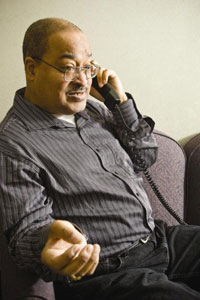Office of Research & Development |
 |


Today a member of the Civil Air Patrol who takes part in search and rescue missions, Glenn Cuff remembers when his military flying career was cut short because of his weight.
"I went into the Air Force the first time for six years," he says. "When I went to re-up they said I was too fat to fly. I had gained too much weight and had unhealthy habits."
Cuff would go on to join the Army Reserve, then the Air Force Reserve. Later, he went to work for US Airways and worked his way up through various jobs with the company, eventually going back to school and getting his wings as a commuter pilot.
Still, he struggled with health problems related to his weight. At his heaviest, Cuff, 5 feet 10 inches tall, weighed 365.
"Back when I got so sick because of my weight and the complications, I became homeless, even though I had a college degree and a pilot's license, and I had owned houses and cars," recalls Cuff.
Through hard work over several years, he turned his life around. He lost 125 pounds. Getting his diabetes under control was also part of the effort.
"When I was first diagnosed with diabetes I was in bad shape and my [hemoglobin] A1C was up near 10. My primary care physician was really mad. Getting healthy was a team effort with my doctor, trial and error with exercise, diet and different medications."
Among other community service, Cuff volunteers at a Vet Center, the Philadelphia VA Medical Center, and a Veterans of Foreign Wars post. He says he wants to "give back to my brother and sister Vets." The peer-mentor research at the Philadelphia VA was a natural fit for him.
"Participating in this study was great for me because I already was talking with my peers to find out how I could help them," shares Cuff. "If we start on common ground, we can help each other. I'm not there to preach to them. We really became friends."
He recounts some of the ways in which he helped other Veterans in the study: "I told them to call me anytime. If they were at a family party and there was a peach pie on the table and they wanted to have it, they could call me and be honest about it. I'd tell them to have just a small slice of pie and next time whittle it down to a smaller slice."
Cuff shared medically sound advice that had paid off for him. "Don't try to stick to unreasonable diets. When a person has been eating like that for years, you cannot cut them off cold turkey."
Reducing sugar intake was another strategy. "I've been sugar-free for three years. For some of these guys, if you can cut out sugar, that's half the battle."
Though the research has ended, Cuff has no intention of phasing out his relationships with the Veterans he helped. "As long as they want me to, I'll be there for them."